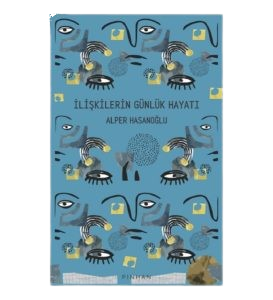Terapistimin ofisinin yeni bir yere taşınacak olması kendi başına terapi konusuna dönüştü.
Normalde 12 dakikada yürüdüğüm ofisin yeni yerine gitmek artık yürüyerek 25 dakika sürecekti. Taşınma haberini aldıktan sonra, taşınma gerçekleşene kadar geçen 10 günlük sürede sürekli olumsuz olana odaklandığımı ve konforumda olacak bu azalmayı zihnimde büyüttüğümü fark ettim.
Oysa zihinsel alet çantamda bu gibi durumlarda kullanabileceğim pek çok araç vardı:
- Perspektife koymak: Bu aktivitenin hayatımda kapladığı yeri hatırlatmak. Bu benim sadece haftada bir ya da iki kez yaptığım bir aktivite, her gün gittiğim bir yer değil. Bu benim haftamın ufak bir kısmını etkileyecek bir gelişme.
- Şükretmek: Terapistim Anadolu yakasına da taşınıyor olabilirdi, ya da doğum iznine ayrılıyor olabilirdi. Mevcut durumun daha kötü pek çok versiyonu olduğunu kendime hatırlatarak şükredebilirim.
- Olumsuzdaki olumluyu görmek: Evet evime daha uzak bir yere taşınıyor ama bu beni daha uzun yürüyüş yapmaya mecbur kılacak ve hareket etmek sağlığım için faydalı olacak. Ya da taşındığı mahalleyi pek iyi tanımıyorum, bu vesileyle yeni bir mahalleyi keşfetmiş olacağım.
- Önemli olana odaklanmak: Terapiye giderken önemli olan iyi bir ilişki kurduğum, kendimi rahat hissettiğim ve fayda gördüğüm birisiyle çalışmak. Evime yakınlığın en önemli kriterim olmadığını kendime hatırlatmak …
- Kontrolümde olana odaklanmak: Ofisin konumu benim kontrolümde değil ama ulaşımımı nasıl sağlayacağım ya da devam edip etmeyeceğim benim kontrolümde. Yürümeye üşendiğim zamanlarda araba ile gidebilirim demek de kontrolümde olana odaklanmak ve esnemek için güzel bir başlangıç.
Sizin de aklınıza gelen başka bakış açıları varsa lütfen benimle paylaşın.

Sugar addiction has been an ongoing battle for me since middle school. I use sugar to soothe myself from stress and headaches, or use it to get a dopamine hit when I’m bored. I’m interested in reducing glucose spikes to feel better and improve my energy levels. I came across this book in the American Book Center in Amsterdam and was immediately interested when I saw the glucose charts inside.

“The Pathless Path” tells Paul Millerd’s journey of going from traditional employment (GE, McKinsey) to embarking on a journey to follow his interests and eventually becoming a writer after going through difficult times due to health problems and loss of loved ones. Watching videos of Paul, I loved his calm energy. He’s very affable: humble, goofy, and excited like a grown up kid. His book resonated with me because I’m in a similar life stage, on a sabbatical, exploring different interests and paths beyond my software engineering career at big tech companies.

“Stop Asking Questions” is Andrew Warner’s book where he offers short lessons on how to be a good interviewer and podcast host. There are lots of great tactics that can be applied to everyday conversations. Here are my notes from each section:
4. What’s a win for you
Reassures the guest that you care about their needs, establishes trust
- What would make your team happy to hear us talk about?
- Why did you agree to do this interview?
- How can I make this interview as useful for you as it will be for me and my listeners?
5. Join the resistance
“I never failed” → “It’s amazing to talk to someone who always got everything right”
“I’m not a worrier” → “I don’t usually get to talk to people who are 100% confident”

Burn Rate is a book about the intersection of mental illness and entrepreneurship. It tells the story of Andy Dunn starting a men’s fashion company, Bonobos, while fighting with bi-polar disorder. Here are some parts that I highlighted:
On mental health:
- When we say someone “is bipolar” rather than “has bipolar disorder” that’s like saying that someone “is cancer” rather than “has cancer.”
- Perhaps depression is the absence of hope.
- I became an expert at camouflage. Hide in workaholism, hide in alcoholism, show no vulnerability, do no serious self-inquiry, and have no hard conversations. In other words: get no help.
- I came to perceive my job as, if not a mood stabilizer, certainly an antidepressant. By demanding so much of me, by insisting that I show up and keep the lights on at the company, the business gave me a purpose that transcended my malaise.
- I wonder if I would have been able to pull this off were it not for those frenetic episodes of elevated mood that bipolar disorder made possible.
- We buy things we don’t need, with money we don’t have, to impress people we don’t like.
On relationships:

“Gel Hayattan Konuşalım” bir söyleşi kitabı. Gazeteci Filiz Aygündüz ve psikiyatrist Alper Hasanoğlu’nun aşk, mutluluk, evlilik, ilişkiler, hayatın anlamı ve ölüm konuları etrafında yaptıkları sohbetin yazıya dökülmüş hali. Filiz Aygündüz gerektiğinde irdeleyen sorularla sohbeti ustalıkla yönlendirmiş ve ortaya kolay okunan, keyifli bir metin çıkmış. Kitabın ilk baskısındaki yazım hataları ise (Lawrence Durrell yerine Durell, adderall yerine adherall) editör Handan Akdemir İngilizce bilmiyor mu diye düşündürtüyor. Sohbet sırasında Alper Hasanoğlu’nun Türkiye’ye dönüş öyküsü ve İsviçre’deki psikanalisti ile yaşadığı deneyim gibi anıları keyifle okudum, kendi hikayesine daha çok yer vermesini isterdim. Okurken aldığım notlar şöyle:

“Ne zaman iyileşiriz?” Erhan Ali Yılmaz’ın bu konuda sunduğu 100 farklı fikiri içeriyor. Her fikir, bir sayfalık yazı ve bir sayfalık çöp adam çizimi ile sunuluyor, dolayısıyla kitap kolayca okunuyor. Maalesef çizimler anlatılanlara bir katkı sağlamadığı gibi, ince kağıda yapılan baskı yüzünden arka sayfadaki yazıları okumayı da zorlaştırmış. Kitaptaki farklı bakış açılarından faydalandım, hatırlamak istediğim kısımlar ise şöyle:
Başlamak, harekete geçmek üzerine:
- Öz şefkat bir düşünce değil, bir aksiyon. İlk adımı, “Bugün neye ihtiyacım var?” sorusunu kendimize sorarak atabiliriz.
- Başlamak için iyi olmak zorunda değilsin. İyi olmak için başlamalısın!
- Sağlıklı beslenmeyle ilgili bir kitap okumak bize kendimizi sağlıklı besleniyormuş gibi hissettiriyor. Zamanımızı şu ana kadar okuduklarımızı uygulamak yerine, yeni şeyler öğrenmekle geçiriyoruz. Bize ve çevremize fayda sağlayan asıl şey elimizdekileri artırmak değil, kullanmak. “Bu konuda ben ne biliyorum? Bunları nasıl kullanabilirim?” diye kendimize soralım.
- Korku bekleyerek geçmiyor. Bisiklete binmeyi öğrenmek için hiç korkmadığımız anın gelmesini beklesek belki de hiçbir zaman bisiklete binmesini öğrenemezdik.
- Hazır hissedene kadar beklersek hayatımızın geri kalanını bekleyerek geçirebiliriz. Hazır hissetmeyi kolaylaştıran bir şey daha var. O da hazır hissetmeyi beklemeden o işin en basit haline başlamak. Mesela evlenmeden önce tatile çıkmak ya da aynı evde yaşamak gibi. Eğer bir bebek yürümeye başlamak için hazır hissetmeyi bekleseydi, hiç yürüyemezdi. O bebek kendisini hazır hissetmeyi beklemeden başladı emeklemeye.
Bilinçli farkındalık üzerine:

Alper Hasanoğlu felsefeye ve sosyolojiye ilgi duyan bir psikiyatr. “İlişkilerin Günlük Hayatı” birkaç sayfalık denemelerin derlenmesinden oluşuyor. Yazarın bu kitapta ele aldığı konular aşk, kadın-erkek ilişkileri, depresyon, psikoterapi ve narsizm. En sonda da bu konuların dışında kalan yazıların bulunduğu bir bölüm var. Hem bilgi veren, hem de sorular soran bir anlatım tarzı var. Hem anlatım biçimi, hem de kısa yazılardan oluşması kitabı okumayı kolaylaştırıp keyifli bir hale getirmiş.
Kitabın en büyük eksikliği sıkça bilimsel çalışmalardan bahsedilip kaynak gösterilmemesi, hatta kitabın bir kaynakçasının olmayışı. Yorumlanan bilimsel çalışmaların muallak oluşu ve yazarın kendi uzmanlığı dışındaki konularda da sıkça genellemeler yapması okuyucuda güven eksikliği yaratıyor. Bu konuda özfarkındalığı yüksek olsa gerek çünkü Terapisti Kim Tedavi Eder? kısmında şöyle bir ifade yer alıyor: “Yetersizlik ve başarısızlık şemalarıyla boğuşan psikiyatr çoğunlukla narsistik bir savunmaya geçer. Bir bakarsınız, yalnızca psikiyatri branşında değil, hayatın her alanında bir uzman gibi konuşmaya, yazıp çizmeye başlamış.”

The Inner Game of Tennis is a book about the mental side of peak performance. It was written in the 70s by a tennis coach. The ideas in the book have larger appeal than just tennis players. It’s fascinating how much thought a tennis coach put into how people learn, and was able to distill methods that can be applied to other fields. There are familiar concepts from meditation like quieting the chatter of your mind by focusing it on your breath or the ball. He says: “What I really wanted, I realized, was to overcome the nervousness that was preventing me from playing my best and enjoying myself. I wanted to overcome the inner obstacle that plagued me for so much of my life.” This resonates with me, there are many situations where after enough practice, the bottleneck for your best performance becomes controlling your emotional state and calming your nervousness: job interviews, public speaking, playing chess etc.

Think Like a Rocket Scientist is a book about different tactics that can be used in our thought process. This book is a great example of well researched non-fiction with 50+ references in the bibliography for each section. It has lots of examples from famous scientists or business life to demonstrate each point. The author studied planetary sciences, worked on NASA’s Mars Exploration Rovers mission and has an interest in astronomy. It was refreshing to see familiar concepts like first principles thinking, Occam’s razor or unknown unknowns illustrated by examples from fields other than technology companies. Here are some parts that I liked from different chapters:









